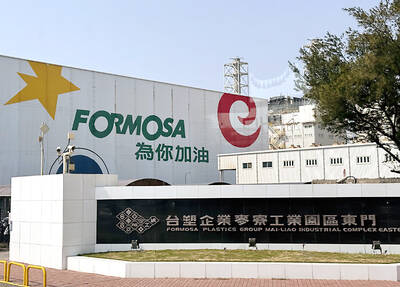The central bank is expected to raise the benchmark rate twice more, in June and September, by 12.5 basis points each, as the three criteria it set to hike rates have been met, UBS Group AG North Asia economist William Deng (鄧維慎) said yesterday.
Central bank Governor Yang Chin-long (楊金龍) set three conditions for it to boost the interest rate: serious domestic inflation, interest rate increases in other economies and economic recovery in the domestic sector, Deng said in a statement.
The three conditions have been met, as the central bank predicts GDP growth of 4.05 percent in Taiwan this year and an annual rise in the consumer price index (CPI) of 2.37 percent, with headline inflation predicted to surpass 2 percent this quarter, Deng said.

Photo: Reuters
Meanwhile, the US Federal Reserve has lifted its rate and indicated that it is to do so a further six times this year, he said.
“We have penciled in two more rate hikes in Taiwan in 2022, each of 12.5 basis points, one at the meeting on Jun. 16 and the other on Sept. 22,” Deng said in the statement.
UBS expects Taiwan’s CPI to exceed 3 percent in the second quarter and be about 2.5 percent in the third quarter, he said.
Although UBS recently revised downward its GDP forecast for Taiwan to 2.8 percent and global GDP growth down by 1 percentage point, Taiwan’s GDP growth is expected to stay above 3 percent for the second and third quarters, Deng said.
Although the central bank’s announcement on Thursday to raise the benchmark rates by 25 basis points might have surprised the market, UBS’ prediction was close to the mark, he said.
“The Bloomberg consensus did not expect the central bank to lift interest rates this March... We were among the few expecting the bank to kick off its interest rate hike in March,” Deng said. “We expect the central bank to take its policy rate back to the pre-COVID-19 pandemic level within the year.”
“A hike of 25 basis points may seem usual for other monetary authorities, but Taiwan’s central bank had only taken a 12.5 basis point step for all rate hikes since 2007,” he said. “The scale of the rate hike [on Thursday] was bigger than usual.”

EXTRATERRITORIAL REACH: China extended its legal jurisdiction to ban some dual-use goods of Chinese origin from being sold to the US, even by third countries Beijing has set out to extend its domestic laws across international borders with a ban on selling some goods to the US that applies to companies both inside and outside China. The new export control rules are China’s first attempt to replicate the extraterritorial reach of US and European sanctions by covering Chinese products or goods with Chinese parts in them. In an announcement this week, China declared it is banning the sale of dual-use items to the US military and also the export to the US of materials such as gallium and germanium. Companies and people overseas would be subject to

Taiwan Semiconductor Manufacturing Co (TSMC, 台積電) founder Morris Chang (張忠謀) yesterday said that Intel Corp would find itself in the same predicament as it did four years ago if its board does not come up with a core business strategy. Chang made the remarks in response to reporters’ questions about the ailing US chipmaker, once an archrival of TSMC, during a news conference in Taipei for the launch of the second volume of his autobiography. Intel unexpectedly announced the immediate retirement of former chief executive officer Pat Gelsinger last week, ending his nearly four-year tenure and ending his attempts to revive the

WORLD DOMINATION: TSMC’s lead over second-placed Samsung has grown as the latter faces increased Chinese competition and the end of clients’ product life cycles Taiwan Semiconductor Manufacturing Co (TSMC, 台積電) retained the No. 1 title in the global pure-play wafer foundry business in the third quarter of this year, seeing its market share growing to 64.9 percent to leave South Korea’s Samsung Electronics Co, the No. 2 supplier, further behind, Taipei-based TrendForce Corp (集邦科技) said in a report. TSMC posted US$23.53 billion in sales in the July-September period, up 13.0 percent from a quarter earlier, which boosted its market share to 64.9 percent, up from 62.3 percent in the second quarter, the report issued on Monday last week showed. TSMC benefited from the debut of flagship

TENSE TIMES: Formosa Plastics sees uncertainty surrounding the incoming Trump administration in the US, geopolitical tensions and China’s faltering economy Formosa Plastics Group (台塑集團), Taiwan’s largest industrial conglomerate, yesterday posted overall revenue of NT$118.61 billion (US$3.66 billion) for last month, marking a 7.2 percent rise from October, but a 2.5 percent fall from one year earlier. The group has mixed views about its business outlook for the current quarter and beyond, as uncertainty builds over the US power transition and geopolitical tensions. Formosa Plastics Corp (台灣塑膠), a vertically integrated supplier of plastic resins and petrochemicals, reported a monthly uptick of 15.3 percent in its revenue to NT$18.15 billion, as Typhoon Kong-rey postponed partial shipments slated for October and last month, it said. The